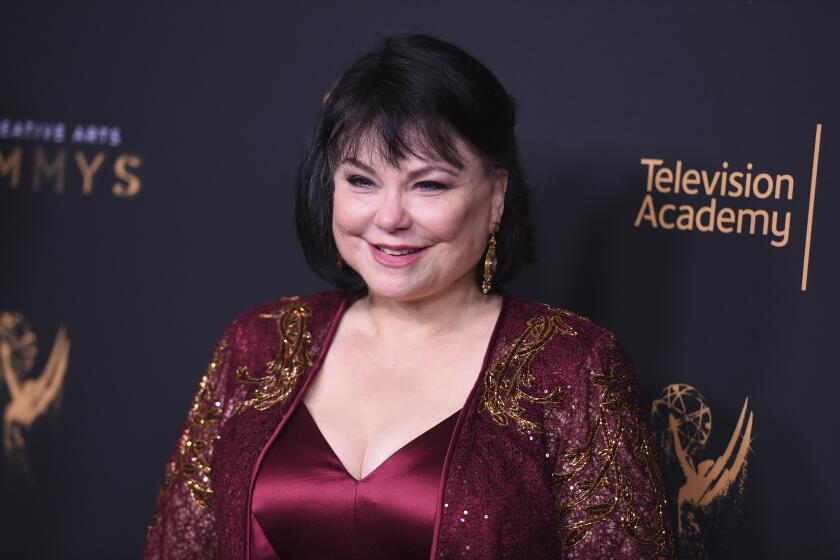Review: Love most complicated in HBO’s ‘Sally4Ever’ and Hulu’s ‘The Bisexual,’ two new U.K. comedies
Two terrific new comedies are coming our way bearing outwardly similar gifts. Each is set in London; each begins with a marriage proposal that sends the intended spinning out of a long relationship into a sort of sexual reorientation.
In “Sally4Ever,” which begins Sunday on HBO, it is Sally (Catherine Shepherd) who finds herself in a same-sex relationship with Emma (Julia Davis, who also writes and directs); “The Bisexual,” premiering Nov. 16 on Hulu, propels lesbian Leila (Desiree Akhavan, co-writing and directing) into experiments with men. Tonally, however, they couldn’t be more different.
“The Bisexual,” co-produced with the U.K.’s Channel 4, is ultimately about love and loneliness, where “Sally4Ever,” made in partnership with Sky Atlantic, is about power — though the former has something to say about power as well, and the latter does not leave out the lonely.
Davis, whose 2016 U.K. series “Camping” was remade this year for HBO by Lena Dunham and Jenni Konner, comes from the British comedy generation that also includes Steve Coogan, Chris Morris, Rebecca Front, Rob Brydon and Julian Barratt, all of whom she’s worked alongside. (Davis and Barratt, who appears in “Sally4Ever,” are additionally the parents of twin sons.)
Her work is dark and acid, bold to the point of abandon, and never sentimental. It’s the antithesis of heartwarming, but it can leave you feeling oddly refreshed, like a bracing chill wind. (Goodness had nothing to do with it, as Mae West used to say.) Where American comedy is loath to refuse its heroes something that looks at least a little like a victory, the British have always been more comfortable leaving their protagonists in the soup; happy endings, if they arrive, are liable to come with at least a drop of irony stirred in. Perhaps it has something to with the Blitz.
In “Sally4Ever,” Sally is living drably with David (Alex Macqueen), who has become nails on a chalkboard to her, a perfect storm of annoying habits, amplified by intense neediness, sexual inadequacy and a cappella singing. You will not be allowed to like him. Early in the first episode he tearfully bludgeons her into accepting a proposal. (“You’re not getting any younger; you’re not going to meet anyone else,” David says, taking up a theme earlier established by her mother, though as it turns out Sally is the series’ main object of desire.) In an unusual moment of decision, she sneaks out to a nightclub, where Emma — a striking woman she has noticed on the Underground, and from whom she has taken a concert flier — is performing.
She is the exciting personality and sexual amphetamine Sally needs to rid herself of David, and for a minute, you think that Emma might be a savior. But once that minute has passed you will begin to suspect that she’s a sociopath, at least by the time she claims to be the daughter of Stanley Kubrick, or perhaps his (nonexistent) brother Derek, who had limbs in strange places and was kept in a basement. (Davis went down a similar road in her 2004 series “Nighty Night.”) Still, it’s hard to say that Sally is worse off — it’s not so much a leap from the frying pan into the fire as from a frying pan into another frying pan, frying up something different. I suppose one can be a psychopath and a savior, in the right circumstances.
We also see Sally away from David and Emma, at work. (It’s a marketing firm; they have been hired to make eggs sexy.) Here we meet Nigel (Barratt), an intelligent, nice guy who in a traditionally appointed romantic comedy would be the person she ends up with; his connection to Sally, unstated, is communicated by conspiratorial, understanding glances, underscored by their shared relative normalcy. Eleanor (Felicity Montagu) regards herself as the inevitable object of Nigel’s affection; she is in a wheelchair: “I was run over. by my mum,” she tells Sally. “I was quite young. She reversed over me and then back again; she said she thought it was a large dog, but we think she knew.” Oafish Mick (Steve Oran) imagines he will wind up with Sally, and is forward.
“The Bisexual” creator Akhavan, who identifies as bisexual herself, directed this year’s Sundance Grand Jury Prize winner “The Miseducation of Cameron Post” (co-written with Cecilia Frugiuele, who also co-writes here), and her television series also has the feel of independent film. It is conversational and quiet, spelled with occasional passages of noise and color and dancing and the threat of farce. (It backs off before things get unnaturally hectic.
Leila (Akhavan), a New Yorker of Iranian descent living in London, is in a relationship with Sadie (Maxine Peake). They are business partners as well, co-founders of a tech startup, who have developed an app that will identify clothing by maker.
Interviewed in their small, youth-staffed office on the eve of the app’s launch, they’re asked a question about having children. This turns into a private conversation (Sadie: “We talked about kids and marriage”; Leila: “We talked about it abstractly, we also talked about euthanasia”), which begets a proposal (from Sadie to Leila), which ends in Leila proposing a break. (Whether a break is a breakup is a question that floats through the season.) Almost randomly, but with clear intention, she goes to bed with a guy.
You very rarely feel manipulated here, only present at different scenes whose outcomes are not inevitable. The only conventional thing Akhavan does here is to skip back several years, just before the climax, to establish first meetings and motivations; that has become something of a standard narrative move in quality modern serial television.
Though it stretches out for conversation and silent behavior — Leila deciding whether to take a jacket off or keep it on, in one memorable instance — “The Bisexual” never feels padded. The dialogue, though smart and (mostly) natural in the actors’ mouths, does not conspicuously sparkle; witticisms are liable to fall flat, to be met with disinterest or incomprehension. (Here is a typical joke: “People from work are having a party.” “Who’s going to be there?” “People from work.”) Though its characters — notably including Saskia Chana as Leila’s deadpan, caustic friend Deniz and new roommate Gabe (Brian Gleeson), a novelist and college professor who is sleeping with one of his students (Michèlle Guillot) — are complicated and make bad choices, they are not monsters. As to the sex, I can’t recall seeing anything at once quite so (R-rated) explicit yet genuinely intimate on television before.
In her early 30s, Leila is younger than Sadie and older than the cool kids who staff her company. She’s old enough to feel old and young enough to feel not too old, and Akhavan catches the transitional moment poignantly and without sentiment. Because the characters and the milieu are well observed — “The Bisexual” does for London what “Girls” did for New York — and naturalistically rendered, the show is moving, at unexpected times, if you have lived much life at all, or even thought about it a little.
‘Sally4Ever’
Where: HBO
When: 10:30 p.m. Sunday
Rating: TV-MA (may be unsuitable for children under the age of 17)
‘The Bisexual’
Where: Hulu
When: Any time, starting Friday, Nov. 16
ALSO
Review: Unhappy ‘Camping’ in a new comedy from Lena Dunham
‘Fleabag’s’ Phoebe Waller-Bridge rides a career launched by a 10-minute sketch
British comic Alice Lowe makes a bloody good directing debut in ‘Prevenge’
Follow Robert Lloyd on Twitter @LATimesTVLloyd
More to Read
The complete guide to home viewing
Get Screen Gab for everything about the TV shows and streaming movies everyone’s talking about.
You may occasionally receive promotional content from the Los Angeles Times.







